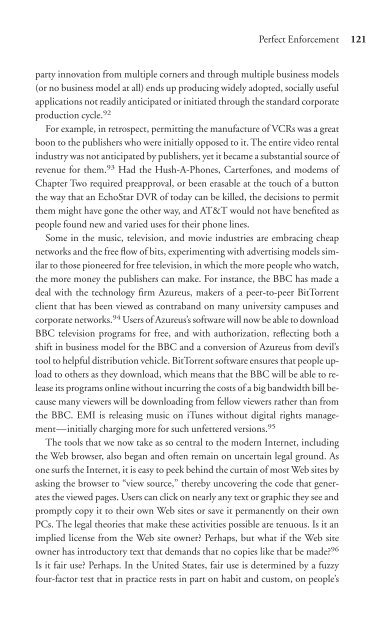Download - Future of the Internet â And how to stop it.
Download - Future of the Internet â And how to stop it.
Download - Future of the Internet â And how to stop it.
You also want an ePaper? Increase the reach of your titles
YUMPU automatically turns print PDFs into web optimized ePapers that Google loves.
Perfect Enforcement 121<br />
party innovation from multiple corners and through multiple business models<br />
(or no business model at all) ends up producing widely adopted, socially useful<br />
applications not readily anticipated or in<strong>it</strong>iated through <strong>the</strong> standard corporate<br />
production cycle. 92<br />
For example, in retrospect, perm<strong>it</strong>ting <strong>the</strong> manufacture <strong>of</strong> VCRs was a great<br />
boon <strong>to</strong> <strong>the</strong> publishers who were in<strong>it</strong>ially opposed <strong>to</strong> <strong>it</strong>. The entire video rental<br />
industry was not anticipated by publishers, yet <strong>it</strong> became a substantial source <strong>of</strong><br />
revenue for <strong>the</strong>m. 93 Had <strong>the</strong> Hush-A-Phones, Carterfones, and modems <strong>of</strong><br />
Chapter Two required preapproval, or been erasable at <strong>the</strong> <strong>to</strong>uch <strong>of</strong> a but<strong>to</strong>n<br />
<strong>the</strong> way that an EchoStar DVR <strong>of</strong> <strong>to</strong>day can be killed, <strong>the</strong> decisions <strong>to</strong> perm<strong>it</strong><br />
<strong>the</strong>m might have gone <strong>the</strong> o<strong>the</strong>r way, and AT&T would not have benef<strong>it</strong>ed as<br />
people found new and varied uses for <strong>the</strong>ir phone lines.<br />
Some in <strong>the</strong> music, television, and movie industries are embracing cheap<br />
networks and <strong>the</strong> free flow <strong>of</strong> b<strong>it</strong>s, experimenting w<strong>it</strong>h advertising models similar<br />
<strong>to</strong> those pioneered for free television, in which <strong>the</strong> more people who watch,<br />
<strong>the</strong> more money <strong>the</strong> publishers can make. For instance, <strong>the</strong> BBC has made a<br />
deal w<strong>it</strong>h <strong>the</strong> technology firm Azureus, makers <strong>of</strong> a peer-<strong>to</strong>-peer B<strong>it</strong>Torrent<br />
client that has been viewed as contraband on many univers<strong>it</strong>y campuses and<br />
corporate networks. 94 Users <strong>of</strong> Azureus’s s<strong>of</strong>tware will now be able <strong>to</strong> download<br />
BBC television programs for free, and w<strong>it</strong>h authorization, reflecting both a<br />
shift in business model for <strong>the</strong> BBC and a conversion <strong>of</strong> Azureus from devil’s<br />
<strong>to</strong>ol <strong>to</strong> helpful distribution vehicle. B<strong>it</strong>Torrent s<strong>of</strong>tware ensures that people upload<br />
<strong>to</strong> o<strong>the</strong>rs as <strong>the</strong>y download, which means that <strong>the</strong> BBC will be able <strong>to</strong> release<br />
<strong>it</strong>s programs online w<strong>it</strong>hout incurring <strong>the</strong> costs <strong>of</strong> a big bandwidth bill because<br />
many viewers will be downloading from fellow viewers ra<strong>the</strong>r than from<br />
<strong>the</strong> BBC. EMI is releasing music on iTunes w<strong>it</strong>hout dig<strong>it</strong>al rights management—in<strong>it</strong>ially<br />
charging more for such unfettered versions. 95<br />
The <strong>to</strong>ols that we now take as so central <strong>to</strong> <strong>the</strong> modern <strong>Internet</strong>, including<br />
<strong>the</strong> Web browser, also began and <strong>of</strong>ten remain on uncertain legal ground. As<br />
one surfs <strong>the</strong> <strong>Internet</strong>, <strong>it</strong> is easy <strong>to</strong> peek behind <strong>the</strong> curtain <strong>of</strong> most Web s<strong>it</strong>es by<br />
asking <strong>the</strong> browser <strong>to</strong> “view source,” <strong>the</strong>reby uncovering <strong>the</strong> code that generates<br />
<strong>the</strong> viewed pages. Users can click on nearly any text or graphic <strong>the</strong>y see and<br />
promptly copy <strong>it</strong> <strong>to</strong> <strong>the</strong>ir own Web s<strong>it</strong>es or save <strong>it</strong> permanently on <strong>the</strong>ir own<br />
PCs. The legal <strong>the</strong>ories that make <strong>the</strong>se activ<strong>it</strong>ies possible are tenuous. Is <strong>it</strong> an<br />
implied license from <strong>the</strong> Web s<strong>it</strong>e owner Perhaps, but what if <strong>the</strong> Web s<strong>it</strong>e<br />
owner has introduc<strong>to</strong>ry text that demands that no copies like that be made 96<br />
Is <strong>it</strong> fair use Perhaps. In <strong>the</strong> Un<strong>it</strong>ed States, fair use is determined by a fuzzy<br />
four-fac<strong>to</strong>r test that in practice rests in part on hab<strong>it</strong> and cus<strong>to</strong>m, on people’s


